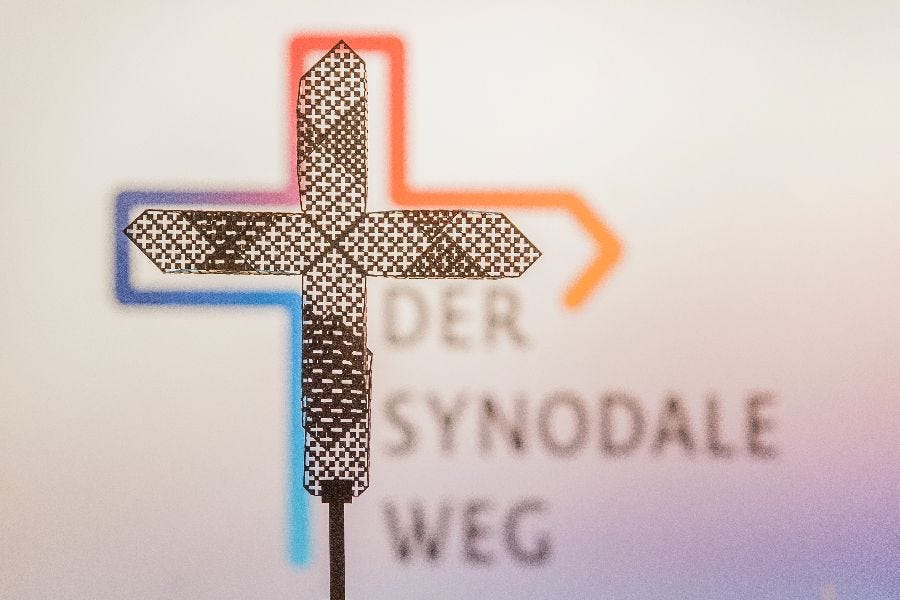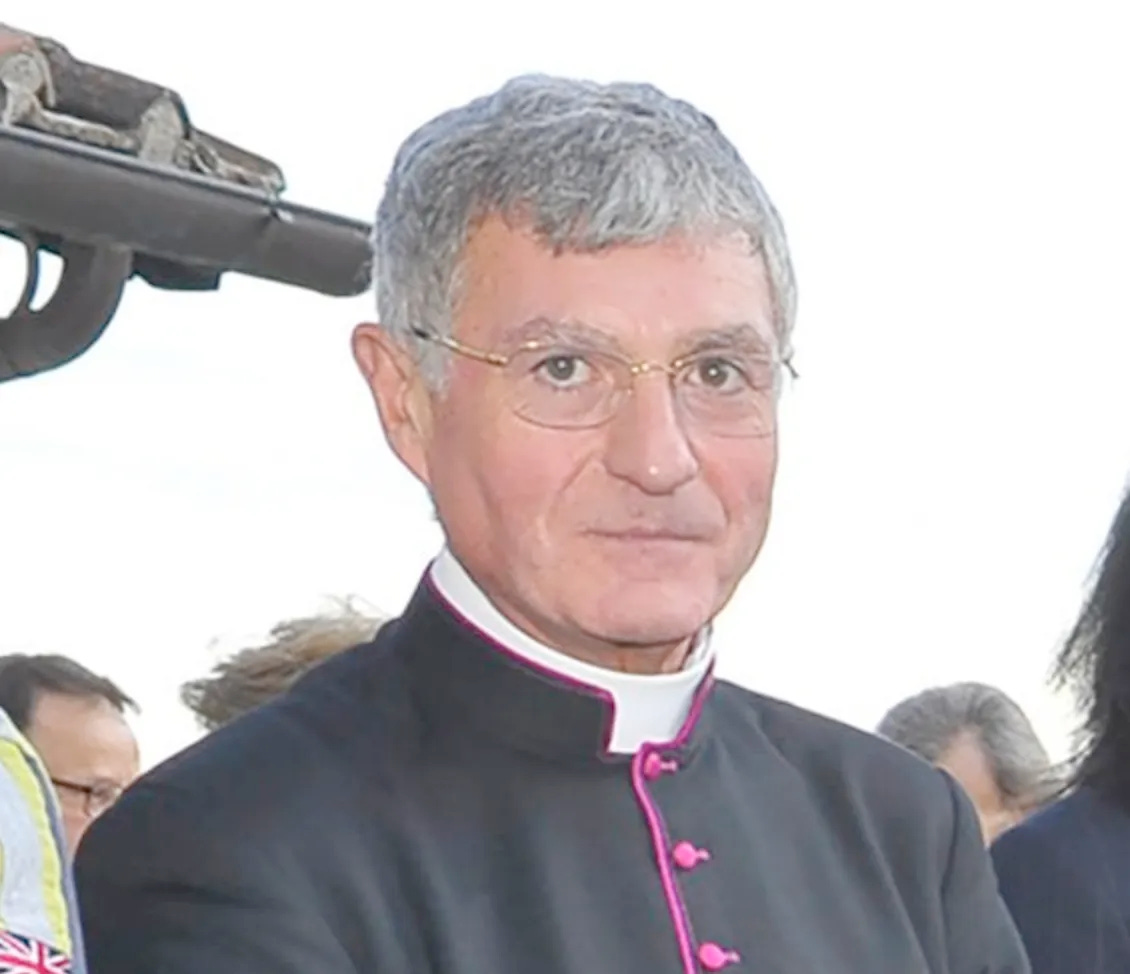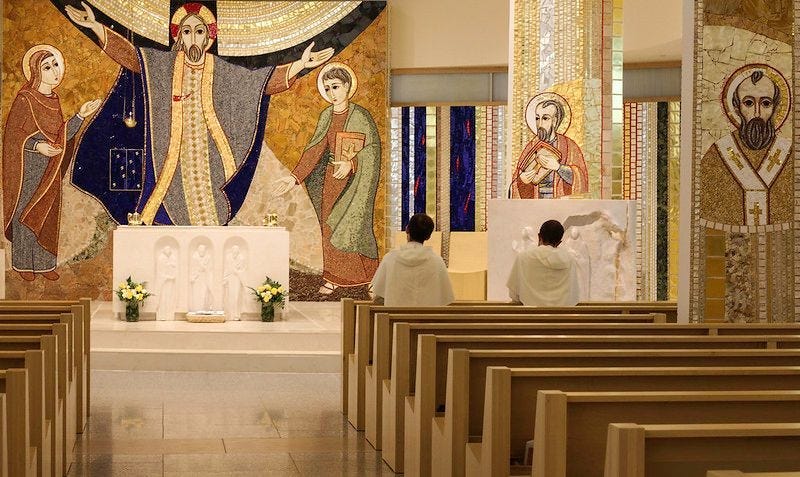
Bishop Georg Bätzing said Monday that he has written to three Vatican cardinals after they ruled out a German proposal to create a permanent “synodal council” of lay people and bishops with governing powers over the Catholic Church in Germany.
The chairman of the German bishops’ conference said Feb. 27 that he had explained in an as yet unpublished letter that the country’s “synodal way” adopted a resolution last September to form a “synodal committee” to prepare the way for an “advisory and decision-making” synodal council.
Speaking on the first day of the bishops’ plenary meeting in Dresden, Bätzing said that the synodal committee would ensure that the synodal council conformed to Church law and did not undermine the authority of diocesan bishops when it was established in 2026.
He stressed that he was willing to resume talks with the three Vatican cardinals “at any time, at short notice,” complaining that it was “difficult” to conduct the conversation through letters.
But the Vatican indicated on the same day that it expected Germany’s bishops to heed a Jan. 16 letter issued by the three cardinal heads of the Secretariat of State, the dicasteries for Bishops, and for the Doctrine of the Faith — Cardinal Pietro Parolin, Cardinal Luis Ladaria Ferrer, and Cardinal Marc Ouellet — who said that the synodal way had no authority to establish a synodal council “at the national, diocesan, or parish level.”
Addressing the German bishops on Feb. 27, the apostolic nuncio Archbishop Nikola Eterović said he had been asked “to specify that, according to a correct interpretation of the contents of this letter, not even a diocesan bishop can establish a synodal council at the diocesan or parish level.”
With Bätzing insisting that the synodal council will go ahead as planned and Rome underlining that it can’t, what is likely to happen next? There are three possible scenarios.
Scenario 1: The German way
In the first scenario, the German bishops would pay lip service to Vatican criticisms of the synodal council, but establish the body largely in the form envisaged by the synodal way, a multi-year initiative bringing together the country’s bishops and select lay people to discuss sweeping changes to Church teaching and practice.
The German bishops’ conference already appears to be heading down this path. According to the synodal way resolution adopted in September, the synodal committee meant to lay the groundwork for the synodal council will consist of 27 diocesan bishops, 27 members chosen by the powerful lay Central Committee of German Catholics (ZdK), and 20 members elected jointly by them. The ZdK has already selected its 27 representatives and the final 20 will be elected to the synodal committee at the synodal way’s fifth and final plenary meeting in Frankfurt on March 9-11.
In this scenario, German Church leaders would have to rely on a tactic employed since the synodal way was officially launched in 2019: creating “facts on the ground” before the Vatican has a chance to react to them and then brushing off its concerns, while hurriedly establishing the next set of “facts.”
Thomas Sternberg, one of the synodal way’s original architects, shed light on this modus operandi in a candid interview last December. Sternberg, a member of Germany’s CDU political party, said that, as a politician, he knew “that it takes processes and developments to make topics worthy of discussion in the first place.”
In this case, the synodal committee would be the “process” through which the German bishops inch ever closer to establishing a synodal council, publicly acknowledging Vatican concerns but striving nevertheless to give it maximum influence over local Church affairs.
This scenario would require some good fortune. One of the three cardinals, the bishops’ dicastery head Cardinal Ouellet, is due to step down in April, while the 78-year-old doctrinal prefect Cardinal Ladaria could be replaced at any time. If the two men were succeeded by figures more favorable to the synodal way, then the German bishops would have a greater chance of establishing the synodal council on their terms.
Scenario 2: The ‘middle way’
Shortly after the three Vatican cardinals’ letter was published, a second scenario was outlined by none other than Bishop Bätzing. He told the Welt newspaper that, while he thought the Vatican was wrong to block the creation of a synodal council, he believed there was a “fallback option.”
“There is still a middle way,” he said. “In Germany, we have had the so-called joint conference since the 1970s, in which the bishops’ conference and the Central Committee of German Catholics (ZdK) consult with each other, that is, lay people and bishops. This joint conference has been given certain tasks. So the fallback option is: we stay with this model and simply add important tasks that are feasible under Church law.”
The joint conference has its origins in the Würzburg Synod, a forerunner of today’s “synodal way,” held from 1971 to 1975. The joint conference’s members — 10 bishops and 10 lay people — meet twice a year to discuss tasks common to both the bishops’ conference and the ZdK.
But would Bätzing be able to sell the idea of a souped-up joint conference to the ZdK, which has appeared to have threatened several times to pull out of the synodal way if its goals are not realized? It would seem unlikely.
The proposal would, no doubt, also be carefully scrutinized by the Vatican to make sure that it wouldn’t detract from the decision-making authority of the German bishops’ conference and individual bishops. That is another count against it.
Scenario 3: The Roman way
In his speech on Monday, nuncio Archbishop Eterović made a very specific suggestion to the German bishops. What if, he said, they modeled the synodal committee on a similar body endorsed by the Vatican?
“The Synod of Bishops offers a good example of such a structure in the Catholic Church,” he said, explaining that before a synodal assembly ends in Rome, participants elect members to a council whose task it is to help the pope write a post-synodal apostolic exhortation and then prepare for the next assembly, usually in three years’ time.
“If one wanted to transfer this practice to the reality of the synodal way of the Catholic Church in Germany,” Eterović said, “a synodal committee of an advisory nature would have to be set up analogously and for a limited period of time to evaluate the documents, because time constraints do not allow for in-depth study during the synodal way.”
“If important decisions are involved, these documents would have to be approved by a two-thirds majority of the members of the German bishops’ conference.”
Anticipating the objection that this committee would lack clout, Eterović argued that “above all, synodality in the Church is more a question of spirit and style than of structures.”
“Instead of establishing new bodies with the risk of a further increase in bureaucracy, it is necessary to revitalize the already existing diocesan bodies in a synodal spirit,” he said, “such as the council of priests, the college of consultors, the pastoral council, or the council for economic affairs, etc.”
But neither the German bishops’ conference nor the ZdK is likely to support this option precisely because the body would operate “for a limited period of time” and not permanently, as outlined in the synodal way resolution.
Also, neither the bishops’ conference nor the ZdK has shown any sign over the past three years that it is open to adopting Roman ways.
Which way now?
The German bishops may indicate which path they are choosing at the end of their plenary meeting in Dresden this week. Their final communiqué could, for example, directly address the question of the synodal council, saying that the bishops firmly support its creation despite Vatican objections.
But the outcome may not be so clear-cut, as the German bishops are deeply divided. While a large majority supports the synodal way unconditionally, a small but significant minority is deeply skeptical of the initiative.
The three Vatican cardinals’ letter was itself a response to a query from five German bishops — from the dioceses of Cologne, Eichstätt, Augsburg, Passau, and Regensburg — about whether they were obliged to take part in the synodal committee.
The Vatican cardinals reassured the bishops that they were under no obligation to join the committee and, in any case, the synodal council was illegitimate as it seemed “to place itself above the authority of the German bishops’ conference and, in fact, to replace it.”
This minority is highly unlikely to support any version of the synodal council after this intervention.
Perhaps the most likely outcome is that the German bishops will acknowledge that their internal divisions are irreconcilable, while the majority continues to work to establish the synodal council, hoping that Roman headwinds will eventually abate.



